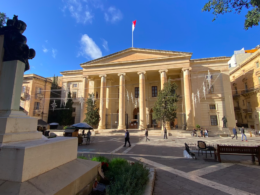As the Malta hospitals concession criminal case takes place, the role of PwC Malta in the saga continues to be conspicuously overlooked. Despite PwC’s intimate involvement in advising the concessionaire, it has remained unscathed, raising concerns about whether Malta’s regulatory bodies are truly impartial or compromised by conflicts of interest. Central to this dilemma is the Malta Accountancy Board, which is tasked with regulating audit firms, but whose chairman, Edgar Borg, has a history that casts doubt on his ability to act without bias.
A Major Role in the Health Ministry
Edgar Borg’s professional background is extensive. In a 2023 interview with The Accountant, Borg detailed his pivotal role as Chief Finance and Administration Officer at the Ministry of Health, a position he has held since 2014. He described managing a health sector budget that doubled over nine years, reaching a staggering €1 billion. This, he noted, positioned the Health Ministry as a behemoth, comparable in size and complexity to even the largest private-sector entities. Leading a team of financial controllers, Borg was directly responsible for overseeing the financing of significant public health projects—one of the largest being the now infamous Vitals Global Healthcare concession.
Before his tenure at the Ministry of Health, Borg held key financial positions, including Finance Director and Group Finance Director at Maltacom plc (now GO), and worked as an independent consultant, auditor, and director. His international experience also spans multiple countries, where he led projects for the International Telecommunication Union, focusing on preparing companies for privatisation and introducing mobile telephony. His career trajectory paints the picture of a seasoned financial expert who has held considerable responsibility within both the public and private sectors.
Conflict of Interest at the Accountancy Board

However, it is Borg’s role in the Health Ministry that raises significant concerns about his impartiality in his current role as chairman of the Accountancy Board. From 2014 to 2024, Borg worked alongside Joseph Rapa, the permanent secretary at the Ministry of Health, who has since faced charges of fraud in connection with the VGH concession. Rapa was one of the key government officials responsible for scrutinising and approving payments to Vitals—a process that the inquiry found had been tainted by fraud and mismanagement. While Rapa faces prosecution, Borg has come through the scandal unscathed, a fact that many find troubling given his close involvement in managing the Health Ministry’s finances during the same period. If Rapa relied on Borg’s extensive professional experience in approving the disbursement of public funds, how was Rapa charged and not Borg? That is a question for the inquiring Magistrate to answer.
Now, as chairman of the Accountancy Board, Edgar Borg is in a position to supervise and regulate the very audit firms implicated in the debacle—most notably PwC Malta, which served as an advisory firm to the Vitals concessionaire. The conflict of interest is glaring. How can the Accountancy Board, led by someone who was so deeply embedded in the financial administration of the Health Ministry during the Vitals project, be expected to objectively regulate PwC’s conduct?
PwC’s Escape from Scrutiny
Adding to the concerns is the stark difference between how PwC Malta has been treated in this saga and how the firm has been held accountable in other jurisdictions. In China, for instance, PwC faced severe legal scrutiny and penalties over irregular auditing practices. The fact that Maltese investigators and regulators have been so lenient towards PwC has raised suspicions that the firm is being protected by powerful interests within the country’s political and corporate elite.
The silence around PwC’s role in the Vitals scandal is deafening, and it only serves to erode public trust in Malta’s regulatory bodies. The Accountancy Board’s mandate is to ensure that auditors and audit firms uphold the highest standards of professionalism and accountability. Yet, under its current leadership, the Board appears to be paralysed by conflicts of interest, unable or unwilling to take action against a firm as influential as PwC.
The Need for Regulatory Accountability
Malta’s regulatory landscape is at a crossroads. The Malta Financial Services Authority (MFSA), which oversees financial institutions and audit firms, may soon face calls to intervene if the Accountancy Board continues to turn a blind eye. The public’s patience is wearing thin, and without transparent and decisive action, the credibility of the entire regulatory framework could collapse.
The stakes are particularly high because the Vitals Global Healthcare case is not just another financial misstep—it represents the most significant public funds’ disbursement failures in Malta’s recent history. The Maltese people deserve answers, and they deserve a regulatory system that can hold even the most powerful players accountable. If the Accountancy Board cannot deliver on this, then its very purpose must be questioned.
We invited Mr Borg to comment on the concerns expressed in this article. Answering through his lawyer, he asserted that “no conflict of interest exists or ever existed.”
Time to Remove the Blinkers
The Accountancy Board, under Edgar Borg’s leadership, must act to restore public confidence. This means subjecting PwC to the same level of scrutiny it would apply to any other firm. If Borg’s past involvement in the Health Ministry clouds his judgement, then it is imperative that independent bodies step in to ensure that justice is served.
The question remains: will Maltese regulators rise to the challenge and finally take off the blinkers? Or will PwC and other audit firms continue to operate under a compromised regulatory system?
Do you know more about this story? Reach out.








